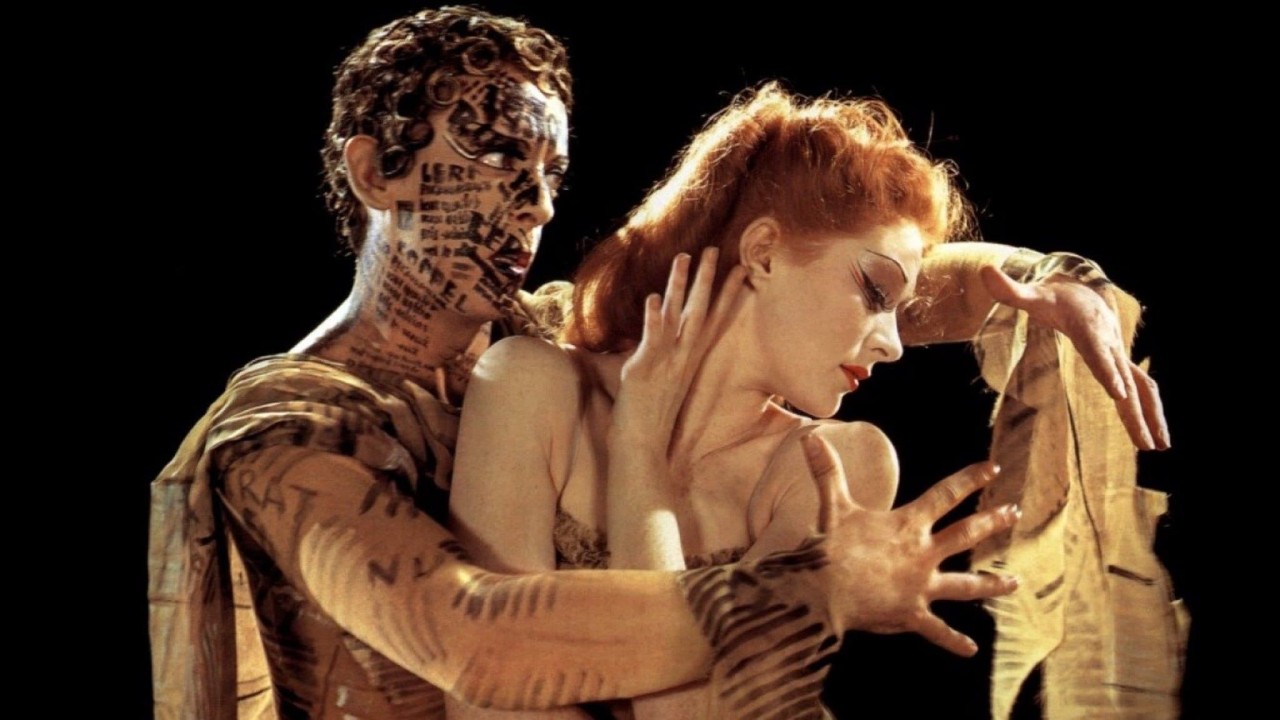By the time this review appears in print, Stanley Kubrick‘s A Clockwork Orange may have won the best movie award from both the New York Film Critics and the National Society of Film Critics, two eminently judicial groups to which your humble reviewer belongs. If such a catastrophe has indeed occurred, I disclaim all responsibility. Under the circumstances, however, I reserve the right to analyze the voting at some later date. For the moment, let me report simply that A Clockwork Orange manifests itself on the screen as a painless, bloodless, and ultimately pointless futuristic fantasy. The first third splashes out of a wide-angle lens like a madly mod picture-spread for Look magazine where Kubrick toiled briefly long, long ago. The middle third provides a moderately engrossing indictment of B. F. Skinnerism in action. But the last third of the movie is such a complete bore that even audiences of confirmed Kubrickians have drowned out smatterings of applause with prolonged hissing.
For once, Kubrick has paid the full penalty for trading at the old stand of middlebrow mystification. Take the title, for example. What is a “clockwork orange?” Anthony Burgess tells us very explicitly in the novel on which Kubrick’s move is based: “‘It’s a book,’ I said. ‘It’s a book what you are writing.’ I made the old goloss very coarse. ‘I have always had the strongest admiration for them as can write books.’ Then I looked at its top sheet, and there was a name — A Clockwork Orange — and I said: ‘That’s a fair gloopy title. Who ever heard of a clockwork orange?’ Then I read a malenky bit out loud in a sort of very high type preaching goloss: ‘ — The attempt to impose upon a man, a creature of growth and capable of sweetness, to ooze juicily at the last round the bearded lips of God, to attempt to impose, I say, laws and conditions appropriate to a mechanical creation, against this I raise my sword-pen — ‘”
Not only does Burgess explain his own title; he manipulates the explanation into an ironic confrontation between bookish libertarianism and brutish libertinism. But why should a moviegoer have to read a Burgess novel for the key to the title of a Kubrick movie? For the same reason, I suppose, that moviegoers some seasons back had to consult an Arthur Clarke short story for the key to the black slab in 2001. Kubrick seems to proceed instinctively on the assumption that there are critics and other would-be opinion leaders who can be conned into mistaking the most obvious obfuscation for genuine profundity. (Poor Jim Aubrey achieves the same effect in the Metro cutting room, and has only lawsuits to show for his labors.)
Moviegoers who are unfamiliar with the Burgess novel may find themselves stymied by the futurist gang-slang language of the adolescent protagonist, Alex (Malcolm McDowell, previously the imp of if….). (Stanley Edgar Hyman of the New Leader provides a helpful afterword and glossary in the Ballantine pocketbook reprint of the novel.) The distancing effect of the dialect is as obvious on the screen as on the printed page. Alex narrates his deeds of ultra-violence and rape with a vocabulary composed largely of Cockney rhymes and puns transliterated from Russian words. Hence, “horrorshow” (good or well) is a playful mediamutation of the Russian “khorosho.” “Gloopy” is more literally “stupid,” and “goloss” is “voice” and “malenky” is “little.” Graphic non-Russian slang may pop up as a public service announcement (cancer-cigarette), a bit of name dropping (charles, charlie — chaplain), posthumously Swiftian bigotry (yahoodies-Jews), or kitchen carnality (pan-handle — erection).
Although Alex shares the sensuous sounds of his exotic vocabulary with his three “drugs” (“friends”), the greater part of the Burgess coinage pours out of the narration as the crackling counterpoint of an anarchic sensibility to the soothing sounds of the “official” English speech of the establishment figures. Burgess lashes out wildly in all directions at a world out of joint and people exclusively by smirking caricatures, but he does pause occasionally to meditate on the paradoxes of violence. If in nothing else, there is paradox enough in the notion of a teenage hoodlum’s getting orgasms from the works of Mozart, Bach, Handel, and the ultra-violent Ludwig Van. Why do I accept this conceit more readily in a book than in a movie? Perhaps because when I do not actually hear Beethoven’s Ninth, I can more readily believe that my neighborhood mugger and rapist can be as moved by the sublime as by the obscene. On the screen with all its looming specters of sociological probability, however, the Kubrick-Burgess-MacDowell ploy with Beethoven and brute force seems too specious buy far. Why not Wagner instead of Beethoven? Or would that be too close to the old-fashioned fun and games in the Nazi concentration camps?
Kubrick has been generally faithful to the narrative outline of the Burgess novel. Alex and his gang prowl the fearfully deserted streets in search of aged victims and rival gangs. They break into two houses, robbing and raping and killing and generally carrying on. Betrayed by his gang, Alex is captured by the police, convicted for murder, imprisoned, and then released at his own request to participate in a brainwashing experiment that will render him allergic to wrong-doing. He is “cured” only to return to a world in which all his erstwhile victims take turns in tormenting him. Driven to suicide by enforced exposure to music (Danish veck (man) Otto Skadelig’s “Symphony Number Three” in the Burgess and Ludwig Van’s Ninth in the Kubrick), Alex awakens in a hospital to find himself a culture hero and no longer allergic either to Beethoven or any of the other manifestations of violence in the divinely human condition.
There are, however, certain crucial differences between the book and the movie. Alex’s first victim in the book is a bookish “lewdie” (from the Russian ludi for people). Alex and his gang not only clobber this fugitive from the “biblio”; Alex goes to great lengths to destroy the victim’s precious, irreplaceable books. Kubrick omits the attack on the bookworm altogether, and plays down the anti-literary assault on the manuscript of an already manic author (Patrick Magee). Later in the book a horde of aged bookworms gang up on the reformed Alex; in the movie the ganging up is done by a street mob of drunken derelicts. Kubrick seems concerned that if Alex’s anti-bookishness were made too explicit, the more literate spectator, unconsciously conditioned by Fahrenheit 451, might be disconcerted by the psychological and cultural improbability of a music lover and a book hater coexisting in the same psyche.
The major discrepancy between the book and the movie, however, is not so much in the narrative line as in the disturbing implications of Kubrick’s decor and mise-en-scene. The very first close-up of Malcolm McDowell’s predatory, bird-like eyelashes evoke similar stylistic flutters with Linda Hayden in Alistair Reed’s Baby Love and with Shelley Duvall in Robert Altman‘s Brewster McCloud. But Kubrick is nothing if not original in a sourly eccentric way. McDowell’s false eyelashes adorn only one of his eyes on a perpetually smirking countenance. An impressive face to be sure, capable of the most devilish activities, but as Kubrick pulls away from the close-up to the pornographic fixtures of the milk bar, Ales and his friends are left off the hook. Anything this particular society gets, it asks for in the vile literalism of its lewdness.
Time and again Kubrick pulls back from scenes of violence to show us end-of-the world compositions more appropriate to the Orphic concerns of Cocteau in the ’50s than to the rest of us in the ’70s. Significantly, Burgess’s Alex kills a woman with a bust of Ludwig Van when she comes at him with a stick. By contrast, Kubrick’s Alex kills his victim with a glass sculpture of Penis and Testicles when she comes at him with a bust of Ludwig Van. There are no visual suggestions in the novel for Kubrick’s exploitation of Pornographic Pop as the presumed life style of Alex’s upper-class victims. Whereas Burgess signals a prevailing mediocrity in the society at large, Kubrick overdesigns every social occasion into a disconnected grotesqueness. Alex’s parents, for example, seem to be on the verge of crashing through into a Joe Orton play, but they never quite make it. A British jail guard overplays the old regimental discipline to the point that he seems a fugitive from Gunga Din. And Patrick Magee, already an overworked cliché of Marat-Sadism for all seasons, gives under Kubrick one of the most embarrassing performances of the year.
As if his apocalyptic décor and apoplectic players were not disruptive enough, Kubrick tricks up his feeble continuities with the kind of speeded-up camera sexploitation scene that wins prizes at erotic film festivals for “humor,” and then some slow motion violence that is even more soporific than the claustrophobic unreality of his standard shots full of wide angles and shallow feelings.
But don’t take my word for it. See A Clockwork Orange for yourself and suffer the damnation of boredom. For those who recall my partial recantation on 2001, don’t expect me to backtrack this time. There was, after all, something of the prophet in the Kubrick of 2001 The inexhaustible dullness of the subsequent moon probes confirmed Kubrick’s dour vision on a very minor level. But I don’t feel that either Burgess or Kubrick are wired into the immediate future with A Clockwork Orange. At the moment, I am not particularly concerned about big Brother clamping electrodes on my skull, nor about the tyranny of Law and Order. What frightens me is the chaos that engulfs us all. I am tired of the cult of violence. I am tired of people smashing other people and things in the name of freedom and self-expression. But that has nothing to do with the ultimate failure of A Clockwork Orange as a movie. What we have here is simply a pretentious fake.
Village Voice, December 30, 1971, Vol. XVI, No. 52





